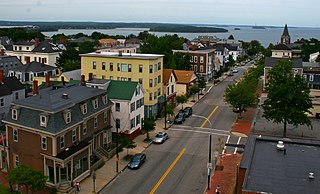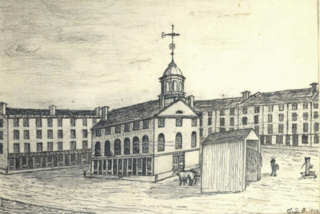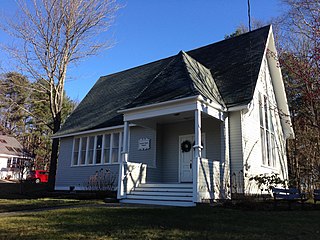
Falmouth is a town in Cumberland County, Maine, United States. The population was 12,444 at the 2020 census. It is part of the Portland–South Portland–Biddeford, Maine metropolitan statistical area.

Casco Bay is an inlet of the Gulf of Maine on the coast of Maine in the United States. The National Oceanic and Atmospheric Administration's chart for Casco Bay marks the dividing line between the bay and the Gulf of Maine as running from Bald Head on Cape Small in Phippsburg west-southwest to Dyer Point in Cape Elizabeth. The city of Portland and the Port of Portland are on Casco Bay's western edge.

Peaks Island is the most populous island in Casco Bay, Maine. It is part of the city of Portland and about 3 miles (4.8 km) from downtown. The island is served by Casco Bay Lines and has its own elementary school, library, and police station. Due to its size, it is the only island in Casco Bay that allows cars throughout.

Fort Gorges is a former United States military fort built on Hog Island Ledge in Casco Bay, Maine, United States. Built from 1858 to 1864, no battles were fought there and no troops were stationed there. Advancing military technology, including iron clad ships and long range guns, rendered the fort obsolete before it could be used. The fort is now a park, accessible only by boat. It was added to the National Register of Historic Places in 1973.

Munjoy Hill is a neighborhood and prominent geographical feature of Portland, Maine. It is located east of downtown and south of East Deering, the neighborhood via Tukey's Bridge. In the nineteenth and twentieth centuries, the neighborhood had a large Irish and Italian American population.

Eagle Island is an island in Maine's Casco Bay and the site of the summer home of the North Pole explorer Admiral Robert Peary (1856–1920). The island and home are preserved as the Eagle Island State Historic Site.

Pennellville Historic District is a residential district located in Brunswick, Maine. To locals, the neighborhood is known simply as "Pennellville."

The History of Portland, Maine, begins when Native Americans originally called the Portland peninsula Məkíhkanək meaning "At the fish hook" in Penobscot and Machigonne in Algonquian. The peninsula and surrounding areas was home to members of the Algonquian-speaking Aucocisco branch of the Eastern Abenaki tribe who were forcibly relocated to current day Canada during European settlement.

Cousins Island Chapel is an historic non-denominational chapel at 414 Cousins Street on Cousins Island, an island in Casco Bay off the coast of Yarmouth, Maine. Built in 1894 by local year-round residents, it is the most architecturally notable building on the island, and is representative of a late 19th-century trend of building summer chapels in coastal Maine. It was listed on the National Register of Historic Places in 1997.

The East Raymond Union Chapel is a historic chapel at 394 Webbs Mills Road in East Raymond, Maine. Built in 1890, it is a modest wood-frame building with Queen Anne and Gothic Revival styling. It has served as a non-denominational religious meeting place for much of its time; it is now affiliated with the United Church of Christ and the Casco Village Church in Casco. It has scheduled services during the summer. The building was listed on the National Register of Historic Places in 2004.

The Harrison Bird Brown House is an historic house at 400 Danforth Street in the West End of Portland, Maine, United States. It was built in 1861 for Harrison Bird Brown (1831–1915), one of Maine's best-known painters of the late 19th century, and was his home and studio until 1892. The house was listed on the National Register of Historic Places in 1980.
Portland, Maine, is home to many neighborhoods.

The 14th Regiment Armory, also known as the Eighth Avenue Armory and the Park Slope Armory, is a historic National Guard armory building located on Eighth Avenue between 14th and 15th Streets in the South Slope neighborhood of Brooklyn, New York City, United States. The building is a brick and stone castle-like structure, and designed to be reminiscent of medieval military structures in Europe. It was built in 1891–95 and was designed in the Late Victorian style by William A. Mundell.

Battery Steele is a United States military fortification on Peaks Island, Portland, Maine, in Casco Bay. Completed in 1942 as part of World War II, it is located on 14 acres (5.7 ha) on the oceanside area of the island, formerly part of the Peaks Island Military Reservation. It is named for Harry L. Steele, who was a Coast Artillery officer during World War I. It was armed with two 16-inch MkIIMI guns and, with a 12-inch gun battery at Fort Levett on Cushing Island, replaced all previous heavy guns in the Harbor Defenses of Portland. It was built to protect Casco Bay, particularly Portland harbor, from Kennebunk to Popham Beach in Phippsburg. According to Kim MacIsaac and historian Joel Eastman in An Island at War, “Battery Steele is not only the largest gun battery built on Peaks Island, but also an example of the largest battery ever built anywhere in the United States.” In 1995, after decades of non-use, the Peaks Island Land Preserve, a community land preservation group, formed to purchase the area and forever preserve it as a public space. On October 20, 2005, the property was listed on the National Register of Historic Places. Other coast defense structures on the island include fire control towers and the counterweight for a disappearing searchlight tower.
Beckett's Castle is a historic summer house on Singles Road in Cape Elizabeth, Maine. A picturesque two-story stone building with a three-story tower, it was built in 1871-74 by Sylvester Beckett, a Portland lawyer and a major figure in the city's literary scene. It was listed on the National Register of Historic Places in 1974, for its association with Beckett, and for its distinctive Gothic architecture.

The Captain S. C. Blanchard House is an historic house at 317 Main Street in Yarmouth, Maine. Built in 1855, it is one of Yarmouth's finest examples of Italianate architecture. It was built for Sylvanus Blanchard, a ship's captain and shipyard owner. The house was listed on the National Register of Historic Places in 1979. The building is now home to the 317 Main Community Music Center.

The J.B. Brown Memorial Block is a historic commercial building at Congress and Casco Streets in downtown Portland, Maine. Built in 1883 to a design by John Calvin Stevens, it is one of the city's few examples of Queen Anne Victorian commercial architecture. It is named in honor of John Bundy Brown, founder in 1855 of the Portland Sugar Company. Brown's signature is visible in the cement block above the main entrance to the building.

The Eighth Maine Regiment Memorial, now the 8th Maine Lodge, is a historic summer fraternal meeting house at 13 Eighth Maine Avenue on Peaks Island, an island neighborhood of Portland, Maine. Built in 1891 as a reunion site for veterans of the American Civil War 8th Maine Volunteer Infantry Regiment, it is a fine example of Shingle style architecture, and an important work of the local architectural firm of Fasset and Tompson. It was listed on the National Register of Historic Places in 2006, and presently operates as a summer lodge and museum, with rooms rented to the public.

The Marine Hospital is a historic medical facility at 331 Veranda Road on Martin's Point in Portland, Maine. Built in the late 1850s to a design by Ammi B. Young, it is the only known surviving Marine Hospital of the period to retain original iron railings. The building is now part of the Portland campus of the Martin's Point Health Care medical practice. It was listed on the National Register of Historic Places in 1974.

The Bartlett Roundhouse, also known as the Bartlett Engine House, is a historic railroad service facility in Bartlett, New Hampshire. Located just south of United States Route 302 and east of Pine Street, it consists of a multibay service building and the remains of a 56-foot (17 m) railroad turntable which provide access to the service bays. Built in 1887–88, it is a reminder of the historic importance of the railroad in the local economy. The site was listed on the National Register of Historic Places in 2015, and the New Hampshire State Register of Historic Places in 2008.




















